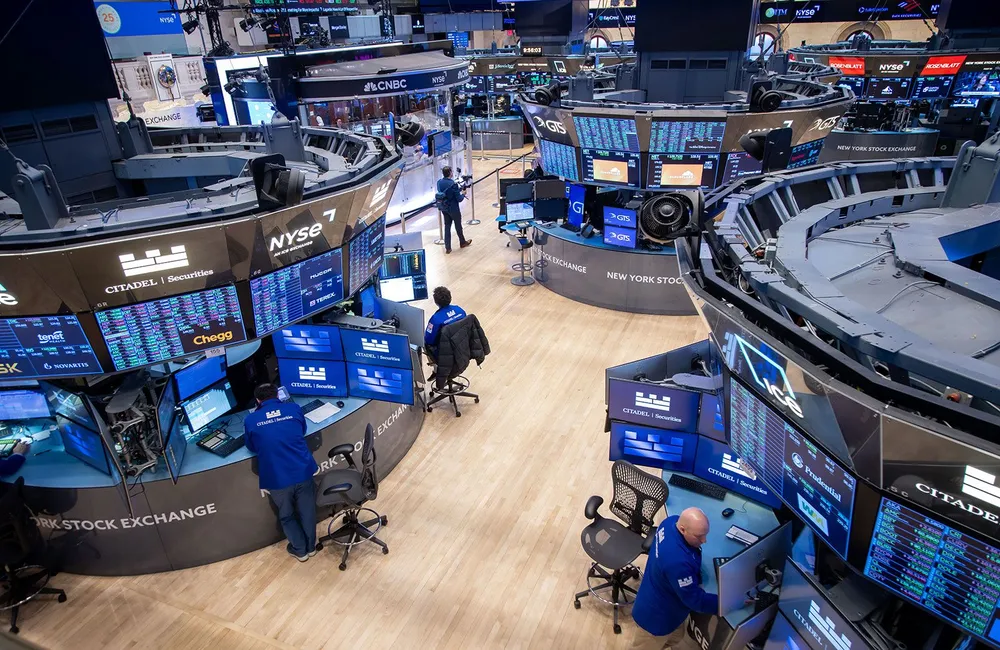ASX futures were 79 points or 1.2pc higher at 6626 as at 8.00am Wednesday, indicating a sharp rise at the open.
The S&P 500 climbed 2.8 percent overseas. The tech-heavy Nasdaq Composite added 3.1%, and the Dow Jones Industrial Average advanced 2.4%. Both of those post large gains since June 24. They are up more than 6 percent from their mid-June lows, but are down sharply for the year.
Investors are scouring earnings reports for signs of how decades-high inflation is weighing on corporate profits and consumer spending. Bank profits are also commonly seen as a readily available gauge of where the broader economy is going, because their businesses are tied closely to the health of consumers and businesses. On the bank’s earnings call this week, Bank of America chief executive Brian Moynihan said that the bank’s customers’ ability to withstand the crisis and their health continue to be strong.
“If you look at what’s going on in the real economy through the eyes of our customer base… I would say at this point it’s less than 50/50 that we end up in a recession,” Bruce Van Saun, CEO of Citizens Financial Group, which reported earnings that topped expectations Tuesday, told CNBC.
On a local level the S&P/ASX 200 closed down 0.6% at 6649.6 on Tuesday, with nearly every sector in the red. The index opened a little down after weak US markets and fell steadily through the day.
In percentage terms the tech and health sectors posted the biggest declines, with device-makers ResMed and Cochlear down 4.6 per cent and 4.8 per cent respectively.
Block, WiseTech and Xero lost between 2.9% and 6.0% as tech gave back the previous session’s gains.
The financial sector finished flat as gains by Commonwealth, Westpac and NAB were cancelled out by losses for wealth managers.
The energy and utilities industries added 2.45% and 1.0%, respectively, helped by stronger oil prices.
In the commodities space, Iron ore slid 2.2% to US$105.26, Brent crude added 1% to US$107.34 and gold slipped 0.1% to US$1709.60.
Locally, 2 Year Australian government bond yields moved higher to 2.72% and 10 Year yields were up to 3.50%. Overseas, yield on 2 year US Treasury notes at 3.24% and yield on 10 year US Treasury notes at 3.02%.
The Australian dollar is trading higher at 68.96 US cents from 68.09 US cents on Friday. The Wall Street Journal Dollar Index, which measures the U.S. Dollar against 16 other currencies,
Asia
China stocks are down in morning trade, triggered by auto shares. The benchmark Shanghai Composite Index falls 0.2% to 3270.52, the Shenzhen Composite Index slips 0.2% to 2187.64 and the ChiNext Price Index sheds 0.7% to 2780.01. Auto stocks are down on worries that a surge of Covid-19 cases in China could dent demand for cars and disrupt production. BYD Co. declines 1.6% and SAIC Motor is down 0.2%. The property market could be a focus point after news that China may permit letting out the air of the balloon here by allowing suspended mortgage payments for stalled property projects in the wake of violent protests, says Commerzbank in a note. Because real estate comprises at least 20% of GDP, stabilizing real estate will continue to be an important factor in China's economic health in 2H, they add.
Hong Kong's benchmark Hang Seng Index finished down 0.9% at 20661.06, underperforming regional equities as consumer-related and tech stocks weighed. Electronics stocks were sold off, with Apple suppliers BYD Electronic falling 8.9%, Sunny Optical down 3.7% and AAC Technologies sliding 3.1% after a media report that the US tech giant would cut back on hiring. Among technology companies, Alibaba Group retreated 2.9%, Meituan fell 0.3% and Tencent Holdings climbed 0.2%. Among gainers, Wuxi Biologics added 1.6% after it forecast a 35%-37% surge in 1H net profit. Chinese oil majors added to Monday’s gains on the back of surging oil prices, with Cnooc, Sinopec and PetroChina rising 0.3%-1.1%.
Japanese shares finished higher, with advances in electronics and shipping shares leading the way, as hopes for a recovery in earnings remained from the damages of the Covid-19 pandemic and concern about operating costs abated a bit. Yaskawa Electric rose 3.6% and leading shipper Mitsui O.S.K. Lines advanced 3.9%. The Nikkei Stock Average climbed 0.6% to 26961.68. Investors are looking ahead to the earnings season that begins later this week.
Europe
European markets climbed amid reports that a closed European gas pipeline might reopen on Thursday as scheduled, diminishing energy-supply concerns. The pan-European Stoxx Europe 600, the French CAC 40 and the German DAX rose more than 1 percent and the German DAX, were up 2.7 percent.
“For Europe, the big threat has always been whether Russia would switch the Nord Stream 1 gas pipe work back on,” writes IG analyst Joshua Mahony. "But the latest rumour that the gas will once again be allowed to flow has given European indices a shot in the arm, even if they don't know how much will come through.
The European Central Bank appears on track to hike interest rates for the first time in 11 years when it meets Thursday. Interest-rate hikes generally strengthen currencies as investors earn more to own those assets.
Officials will discuss raising interest rates by a half-percentage point, The Wall Street Journal reported. Economists, however, still anticipate a quarter-percentage-point rise, broadly in line with what Christine Legarde, the ECB’s president, has signalled.
London’s FTSE 100 rose 1.01%.
North America
The nation’s stock indexes experienced their largest one-day gains in almost a month on Tuesday, with investors expressing optimism in the face of a new round of company earnings reports.
The S&P 500 added 2.8%. The tech-heavy Nasdaq Composite rose 3.1 percent and the Dow Jones Industrial Average rose 2.4 percent. All three indexes recorded their largest one-day point and percentage gains since June 24. They are up more than 6 percent from their mid-June lows, though still far off for the year.
Investors are sifting through earnings reports to gauge how decades-high inflation is causing companies’ profits to be squeezed and consumers’ spending to be deterred. Economists have been increasing the odds that the United States will fall into recession in the next 12 months, fearing that higher interest rates that the Federal Reserve imposed to contain inflation will drag down growth.
Yet some investors are watching for cues from executives that the economic horizon might not be as bleak as feared.
“If you go out into the real economy, and you look miles out through the eyes of our customers, I’d say it’s probably less than 50/50 that we end up with a recession at this point,” Citizens Financial Group CEO Bruce Van Saun, whose earnings released posted a beat Tuesday, said.
Bank earnings are seen as a leading indicator for the trajectory of the broader economy, because their businesses tend to move in lockstep with the health of consumers as well as businesses. Bank of America’s chief executive, Brian Moynihan, also said earlier this week on the bank’s earnings call that the bank’s customers’ “resiliency and health” is solid.
“That’s when these leaders say we’ve got inflation under control or the general business climate is becoming more hospitable. That's what markets react positively to,” said Christopher McMahon, president and chief executive of Aquinas Wealth Advisors.
Netflix, which reported after the market closed, said that it had lost subscribers for the first time in two consecutive quarters for the first time in its history. But the streaming giant lost fewer customers than it had forecast 970,000, versus the projected two million. Shares gained in after-hours trading.
Investors are closely watching for comments about companies’ plans to pull back on hiring or other investments. A number of technology companies, including Apple, Microsoft and Alphabet’s Google, have already slowed hiring or eliminated jobs.
“If the corporate sector begins to reduce investment spending, that’s for me the final nail in the coffin,” said Luca Paolini, chief strategist at Pictet Asset Management.
Hope for growth and profits worldwide sank to a historic low in July, according to the latest global fund manager survey from Bank of America on Tuesday. Investors’ stock allocation, meanwhile, is at its lowest since October 2008, according to the survey.
"When you've got performance crushing to the downside, what is the incentive to be optimistic?” said Mark Hackett, the Nationwide Investment Management Group chief of investment research.” “The market has already priced in extreme pessimism.”
The WSJ Dollar Index, which gauges the dollar against a basket of 16 currencies, slid 0.5%. A falling dollar probably had given stocks a lift, said Anthony Saglimbene, the global market strategist at Ameriprise Financial Inc.
“If it continues to march higher, it’ll be a headwind,” Mr. Saglimbene said.
The dollar has jumped against other currencies this year as investors take refuge from plummeting stocks and bet on economic resilience from the United States. The euro, which fell to parity with the dollar last week, climbed 0.8% to $1.0227.
In the day’s company news, shares of International Business Machines tumbled $7.25, or 5.25 percent, to $130.88, after the technology company said the closure of its Russia operations and a strong dollar had a negative effect on its quarterly results. Lockheed Martin shares added $3.10, or 0.8 percent, to $390.38 after the aerospace and defense contractor reported results that fell short of analysts’ profit and sales estimates.
Shares of Johnson & Johnson dropped $2.54, or 1.5 percent, erasing an earlier gain, to close at $171.69. The pharmaceutical and consumer health products maker on Tuesday reported a profit and sales that surpassed expectations but cut its earnings outlook for 2019. Halliburton stock was up 62 cents, or 2.1 percent, to $29.46 after the oil services company beat profit and revenue expectations.
In bond markets, the yield on the benchmark 10-year Treasury note inched up to 3.017% from 2.959% Monday. Yields and prices trade in the opposite direction. And on energy markets, Brent crude, the international benchmark for oil prices, increased 1 percent to $107.35 a barrel.





















